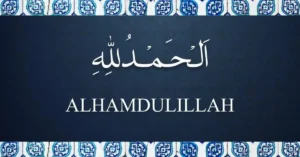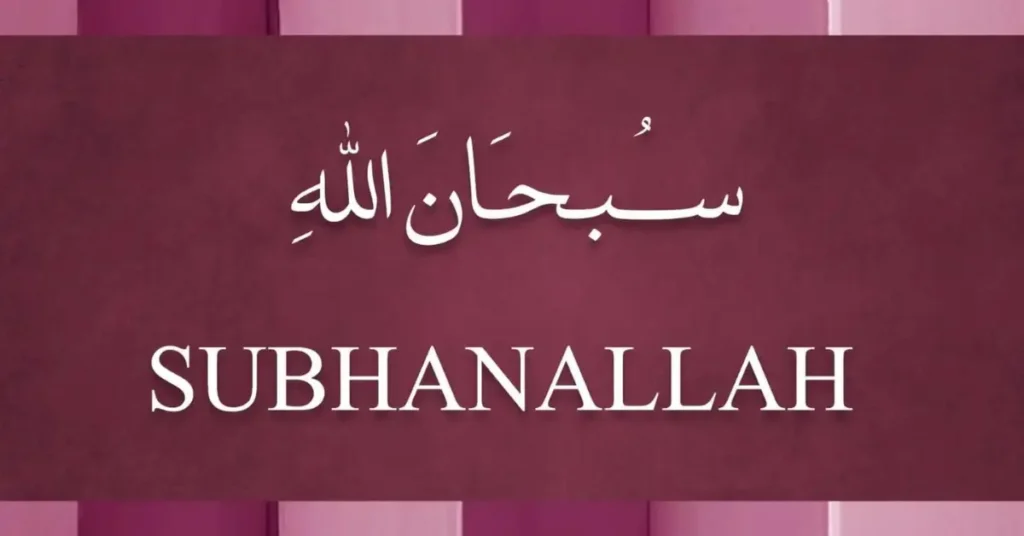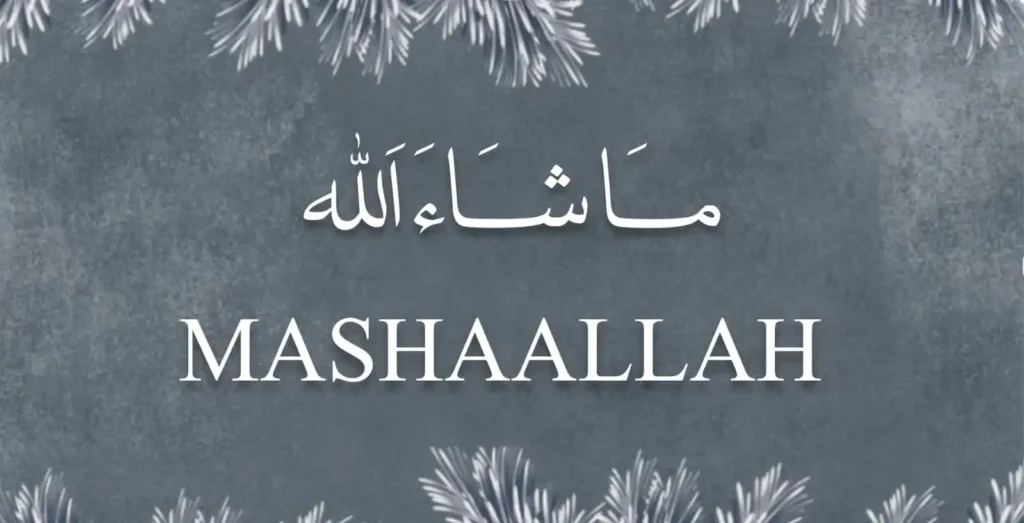
What Does Alhamdulillah Mean?
Alhamdulillah is an Islamic word that means “Praise be to Allah.” Muslims use the word Alhamdulillah to thank Allah for His countless blessings. Alhamdulillah finds its place in joy and in difficulties too. In fun, by saying Alhamdulillah, a Muslim can show acceptance and happiness in the things happening in daily life. While in sorrow and hardship, by saying Alhamdullilah, a Muslim can show his patience and hope in the condition he is passing through.
In Quran:
"Alhamdulillah for everything I have, Alhamdulillah for everything I had, and Alhamdulillah for everything I will have."
Alhamdulillah In Arabic
In our daily prayer, we begin our salah by saying, “Alhamdulillah Rabbil ‘aalameen,” which means we praise Allah for His blessings. In Arabic, Alhamdulillah is written as اَلْحَمْدُ لِلّٰهِ.
Do You Want To Know How To Pronounce Alhamdulillah?
The word Alhamdulillah is divided into small steps:
- “Al,” which means “alms.”
- “Hamd,” which means “hamstring.”
- “U,” which means “put.”
- “Li,” which means “leek.”
- “Lah,” which means “lava.”
By putting it all together, it is pronounced as “Al-ham-du-li-lah.
Alhamdulillah As A Daily Practice

There are some ways in which we should practice Alhamdullilah daily;
- Muslims wake up in the morning and say Alhamdulillah to thank Allah for granting another beautiful day.
- Muslims should say Alhamdulillah after having a meal.
- Muslims should say Alhamdulillah in remembrance of Allah.
- Muslims should say Alhamdulillah in every Salah five times a day.
- Muslims should also share this practice with others to say Alhamdulillah at every moment.
- After sneezing, we should say Alhamdulillah.
The Power Of Alhamdulillah
The word Alhamdullilah has excellent power. This word strengthens the faith in Allah. It develops a deep connection with Allah. It can relieve their stress. The word Alhamdullilah spreads positivity and faith among Muslims. It can transform attitudes and behavior in human personalities and empower them to face problems with patience.
Alhamdulillah For The Ability To Express Oneself
Alhamdulillah for expressing our thoughts and feelings and communicating with others. Alhamdulillah for sharing our knowledge with others and conveying our messages to others through speaking. We should cherish that Allah has given us the benefit of expressing ourselves to others that we feel and having thoughts for everything.
Alhamdulillah For The Change To Learn And Grow
It is a blessing of Allah that we get a chance to learn and grow. Personal growth is an essential aspect of life to develop knowledge and skills. Learning at different stages leads to solving various problems. Through learning, we know what is good for us and what is not. Thus, we should express thankfulness for this opportunity.
Teaching Children To Say Alhamdulillah

Make sure to practice saying Alhamdulillah in children to teach them a sense of gratitude and praise to Allah. There are some practical ways to prepare them:
- Try to lead them by example by observing their elders and parents.
- Teach them the meaning of Alhamdulillah in simple words.
- Tell them different stories and examples of Alhamdulillah relevant to Islam.
- When your children say Alhamdulillah, appreciate them.
Note: If you want to teach your kids about Quran then go ahead with our course Quran Classes For Kids.
Alhamdulillah For The Blessings Of Nature
As we look around us, we are blessed with numerous blessings. All these blessings show that Allah is the creator of them.
In Quran:
"On Earth, are signs for those whose faith is certain. And also in yourselves. Will you not then see?" (51:20-21)
Nature also provides us with various physical benefits. Spending time in greenery relieves our stress. The fertile Earth provides us with multiple kinds of fruits and vegetables. We should express gratitude and Alhamdulillah beyond the great blessings of Allah.
Benefits Of Reciting Alhamdulillah
There are several benefits of reciting Alhamdulillah. Some of them are:
- It can lead to positive expression towards Allah.
- It can strengthen faith in Allah.
- It can increase the blessings of Allah. Muslims believe they will be blessed with more gifts and benefits by showing gratitude and positivity.
- It also has a psychological impact on Muslims. Saying Alhamdulillah, can also reduce their stress.
Alhamdulillah Quotes
- All praises are due to Allah. The Lord of the Worlds. (Quran 1:2)
- If you are grateful, I will surely increase you in favor). (Quran 14:7)
- My success is only by Allah. (Quran 11:88)
- Allah likes those who are Thankful. (Quran 39:7)
Note: If you want to learn and recite the Quran, then must join our Quran Courses.
Conclusion:
Alhamdulillah is a phrase that shows gratitude and thankfulness for the blessings of Allah. It strengthens Muslims’ faith in Allah and develops a deep connection with Him. Moreover, in our daily routine, when someone asks about our health, we say Alhamdulillah to thank Allah. It also shows Muslims’ kindness to others. Thus, Alhamdulillah is also a reminder for Muslims that they should be thankful for everything happening in their lives.
Note: To have knowledge about more Arabic phrases must read SubhanAllah, MashaAllah, and Allahu Akbar.
Frequently Asked Questions
When and how should I use “Alhamdulillah” in daily life?
It would help if you said Alhamdulillah in every action. Because all goodness comes from Allah, whether it’s a good health report, receiving help from someone, before and after meals, after sneezing, or in other activities.
Is there a specific time or occasion when Muslims say “Alhamdulillah”?
No, there is no specific time or occasion to say Alhamdulillah. You should say it in every daily activity blessed by Allah.
Are there any variations or alternative phrases similar to “Alhamdulillah”?
Yes, there are some alternative phrases similar to Alhamdulillah. These are:
“SubhanAllah” (سبحان الله) for perfection of Allah.
“MashaAllah” (ما شاء الله) when you see something beautiful or unique.
“Allahu Akbar” (الله أكبر) to show the supremacy of Allah.
“Astaghfirullah” (أستغفر الله) to seek forgiveness from Allah.
Can “Alhamdulillah” be used in response to both positive and negative situations?
Yes, Alhamdulillah can be used in both positive and negative situations. In a favorable condition, to be thankful for the blessings of Allah. Use Alhamdulillah to maintain faith and gratitude in Allah in a negative case.
Is “Alhamdulillah” only used by Muslims, or can anyone say it?
Alhamdulillah is an Arabic phrase that Muslims primarily use, but there is no restriction on people of other faiths to express thankfulness in Arabic.
How can I express gratitude in Islam apart from saying “Alhamdulillah”?
There are also other ways you can show gratitude: giving charity, remembering Allah, practicing Duas, helping others, and adopting good manners

Muhammad Ali Mushtaq, a dedicated educationist and the visionary CEO of Noor Ul Quran Education, is passionate about fostering Islamic values and knowledge. With a keen focus on Quranic teachings and Islamic studies, he strives to empower individuals through quality education and spiritual guidance.


